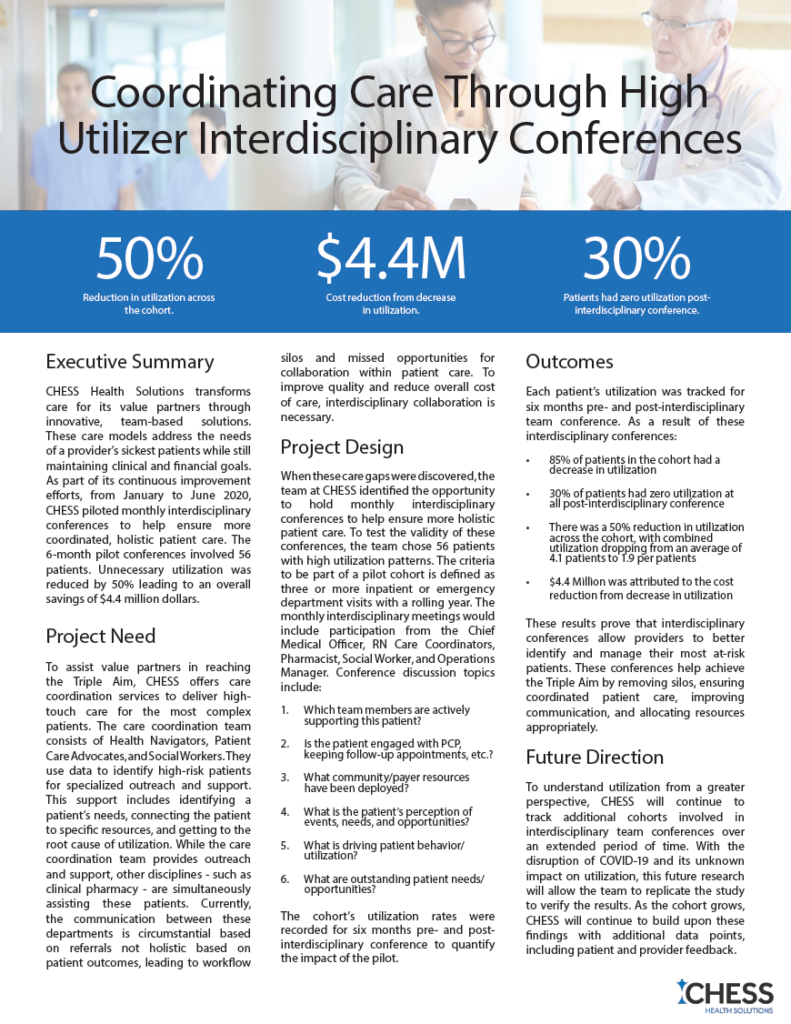
CHESS Health Solutions transforms care for its value partners through innovative, team-based solutions. These care models address the needs of a provider’s sickest patients while still maintaining clinical and financial goals. As part of its continuous improvement efforts, from January to June 2020, CHESS piloted monthly interdisciplinary conferences to help ensure more coordinated, holistic patient care. The 6-month pilot conferences involved 56 patients. Unnecessary or high utilization was reduced by 50% leading to an overall savings of $4.4 million dollars.

Project Need
To assist value partners in reaching the Triple Aim, CHESS offers care coordination services to deliver high-touch care for the most complex patients. The care coordination team consists of Health Navigators, Patient Care Advocates, and Social Workers. They use data to identify high-risk patients for specialized outreach and support. This support includes identifying a patient’s needs, connecting the patient to specific resources, and getting to the root cause of utilization. While the care coordination team provides outreach and support, other disciplines – such as clinical pharmacy – are simultaneously assisting these patients. Currently, the communication between these departments is circumstantial based on referrals not holistic based on patient outcomes, leading to workflow silos and missed opportunities for collaboration within patient care. To improve quality and reduce overall cost of care, interdisciplinary collaboration is necessary.
Project Design
When these care gaps were discovered, the team at CHESS identified the opportunity to hold monthly interdisciplinary conferences to help ensure more holistic patient care. To test the validity of these conferences, the team chose 56 patients with high utilization patterns. The criteria to be part of a pilot cohort is defined as three or more inpatient or emergency department visits with a rolling year. The monthly interdisciplinary meetings would include participation from the Chief Medical Officer, RN Care Coordinators, Pharmacist, Social Worker, and Operations Manager. Conference discussion topics include:
- Which team members are actively supporting this patient?
- Is the patient engaged with PCP, keeping follow-up appointments, etc.?
- What community/payer resources have been deployed?
- What is the patient’s perception of events, needs, and opportunities?
- What is driving patient behavior/utilization?
- What are outstanding patient needs/opportunities?
The cohort’s utilization rates were recorded for six months pre- and post-interdisciplinary conference to quantify the impact of the pilot.
Outcomes
Each patient’s utilization was tracked for six months pre- and post-interdisciplinary team conference. As a result of these interdisciplinary conferences:
• 85% of patients in the cohort had a decrease in utilization
• 30% of patients had zero utilization at all post-interdisciplinary conference
• There was a 50% reduction in utilization across the cohort, with combined utilization dropping from an average of 4.1 patients to 1.9 per patients
• $4.4 Million was attributed to the cost reduction from decrease in utilization
These results prove that interdisciplinary conferences allow providers to better identify and manage their most at-risk patients. These conferences help achieve the Triple Aim by removing silos, ensuring coordinated patient care, improving communication, and allocating resources appropriately.
Future Direction
To understand utilization from a greater perspective, CHESS will continue to track additional cohorts involved in interdisciplinary team conferences over an extended period of time. With the disruption of COVID-19 and its unknown impact on utilization, this future research will allow the team to replicate the study to verify the results. As the cohort grows, CHESS will continue to build upon these findings with additional data points, including patient and provider feedback.


